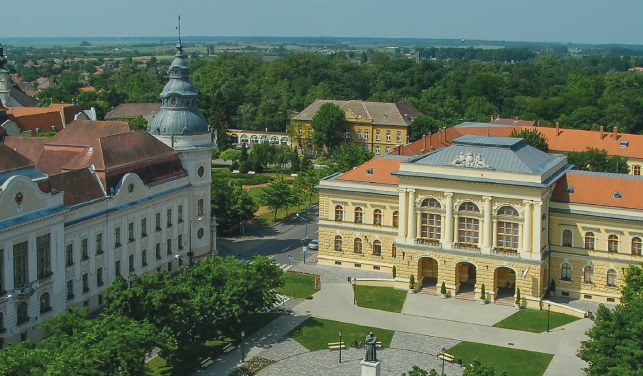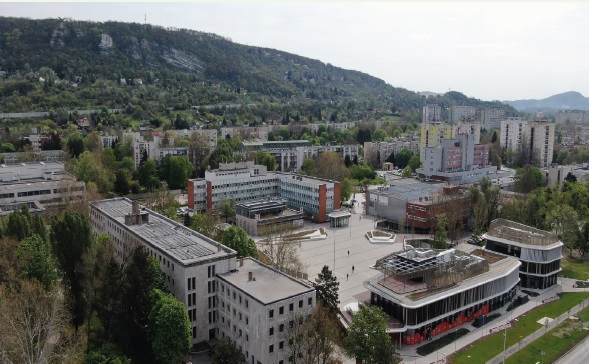 In response to the global climate challenge, three Hungarian cities - Szeged, Szentes and Tatabánya - are implementing projects under the EU's Ready4NetZero initiative. With the support of the European Climate Initiative (EUKI) and cooperation with local communities and businesses, these cities are demonstrating how to successfully combine technological innovation with long-term emission reduction strategies.
In response to the global climate challenge, three Hungarian cities - Szeged, Szentes and Tatabánya - are implementing projects under the EU's Ready4NetZero initiative. With the support of the European Climate Initiative (EUKI) and cooperation with local communities and businesses, these cities are demonstrating how to successfully combine technological innovation with long-term emission reduction strategies.
Szeged: Exemplary energy transition
Szeged, nicknamed the “City of the Sun” for its exceptionally high solar insolation, has set its sights on developing photovoltaics as a key element of its energy strategy. As part of the project, the existing PV installation on the Agora Szent-Györgyi Albert building was expanded, increasing its capacity from 12.5 kW to 100 kW. Thanks to this investment, the share of solar energy in covering the facility's annual demand will increase from 5-6% to 40-45%, which will translate into a reduction in CO₂ emissions of 21.2 tonnes per year. Szeged also plans to extend similar solutions to smaller institutions, proving that photovoltaics can be effective in both large and smaller projects.
Szentes: Geothermal as the foundation for sustainable heating
 Szentes, using its unique geothermal resources, is modernising its district heating system to completely eliminate its dependence on fossil fuels. Currently, 99% of the city's heat comes from 38 existing geothermal wells, and the Ready4NetZero project plans to further develop the infrastructure. The measures include the construction of a new production and re-injection well, the expansion of the mains network and the connection of more public and residential buildings to the system, including the Barth János Horticultural High School and the fire station headquarters.
Szentes, using its unique geothermal resources, is modernising its district heating system to completely eliminate its dependence on fossil fuels. Currently, 99% of the city's heat comes from 38 existing geothermal wells, and the Ready4NetZero project plans to further develop the infrastructure. The measures include the construction of a new production and re-injection well, the expansion of the mains network and the connection of more public and residential buildings to the system, including the Barth János Horticultural High School and the fire station headquarters.
The project will not only reduce emissions, but also increase the energy efficiency of the existing infrastructure. The measures are part of the city's broader strategy to use geothermal energy as a basis for zero-carbon development.
Tatabánya: Public-private partnerships for the climate
 Tatabánya, a former centre of the coal industry, is being transformed into a model example of green transformation based on cooperation with local business. Under the Hand in Hand programme, local companies support public institutions by funding renovations, purchasing equipment or organising educational events. From 2025 onwards, the initiative will be expanded to include “adopt-a-park”, where businesses will fund plantings, the installation of insect hotels and the maintenance of green spaces. In addition, the city will make use of the Energy Efficiency Obligation Scheme (EEOS) mechanism, enabling companies to meet efficiency targets through the thermal upgrading of municipal buildings.
Tatabánya, a former centre of the coal industry, is being transformed into a model example of green transformation based on cooperation with local business. Under the Hand in Hand programme, local companies support public institutions by funding renovations, purchasing equipment or organising educational events. From 2025 onwards, the initiative will be expanded to include “adopt-a-park”, where businesses will fund plantings, the installation of insect hotels and the maintenance of green spaces. In addition, the city will make use of the Energy Efficiency Obligation Scheme (EEOS) mechanism, enabling companies to meet efficiency targets through the thermal upgrading of municipal buildings.
Conclusions: A joint response to the climate crisis
The projects implemented in Szeged, Szentes and Tatabánya illustrate the diverse pathways towards climate neutrality. In Szeged, the investment in photovoltaics proved to be crucial, in Szentes - the maximum use of geothermal energy, and in Tatabánya - the synergy between the municipality and entrepreneurs. The common denominator of these measures, however, is technology integration, public participation and long-term planning.
Ready4NetZero is a EUKI funded project coordinated by the Polish Network “ENERGIE CITÉS”, with a consortium formed of the Ecologic Institute from Germany, ENERGIAKLUB from Hungary, REGEA from Croatia, and Energy Cities Romania. Ready4NetZero aims to support cities from the participating countries in developing and implementing 2050 climate neutrality strategies and seeks to do this by building capacity, knowledge, and skills among local leaders, municipal staff, and local stakeholders, facilitating experiences exchange and dialogue between local authorities.





